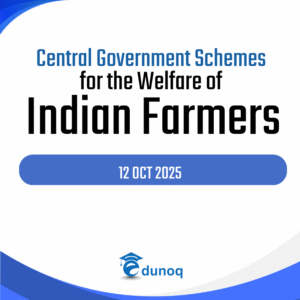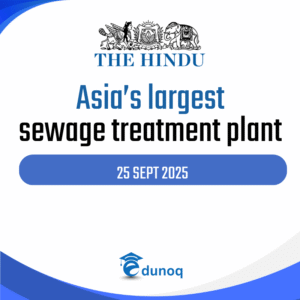Polity & Governance
Supreme Court on Waqf (Amendment) Act, 2025
The Supreme Court gave a mixed ruling on the Waqf (Amendment) Act, 2025. It stopped some controversial rules, like allowing only Muslims with 5 years of practice to create waqf, and giving District Collectors power in property disputes. It also capped the number of non-Muslims in Waqf Boards and directed CEOs should be Muslims. However, it upheld bans on declaring tribal lands or protected monuments as waqf. This judgment is important for UPSC as it connects to minority rights, secularism, property laws, and judicial review in India’s constitutional setup.
Polity & Governance – SC on Waqf (Amendment) Act, 2025
Mains Q: The Supreme Court’s ruling on the Waqf (Amendment) Act, 2025 reflects the balance between minority rights and secular governance. Critically examine.
Prelims Q: Which of the following provisions were struck down by the SC in the Waqf (Amendment) Act, 2025?
(a) Declaring tribal land as waqf property
(b) CEO of Waqf Board must be Muslim
(c) Only Muslims with 5 years’ practice can create waqf
(d) District Collector deciding waqf disputes
Answer: (c) and (d)
Economy
Hard truth about out-of-pocket health expenditure
India’s National Health Accounts (NHA) use data from the NSS health survey to estimate people’s medical expenses. The article highlights that this single-source method has limitations. Household spending on health is often under-reported, creating gaps in policy planning. Experts say multiple data sources are needed for accurate health expenditure numbers. For UPSC, this links to health economics, government health financing, and schemes like Ayushman Bharat. It shows why public spending is critical to reduce out-of-pocket costs that push millions into poverty, reflecting SDG-3 (Good Health).
Economy – Out-of-pocket health expenditure
Mains Q: Out-of-pocket health expenditure continues to push Indian households into poverty. Evaluate why accurate health data is critical for policy, with reference to the National Health Accounts (NHA).
Prelims Q: Out-of-pocket expenditure (OOPE) in health refers to:
(a) Government subsidies on medicines
(b) Household spending from personal income for medical care
(c) Insurance payments made by private companies
(d) CSR funds of corporates in health sector
Answer: (b)
International Relations
EU–India Strategic Agenda Upgrade
India and the European Union (EU) announced an upgraded partnership through a new Strategic Agenda. It focuses on trade, technology, green energy, digital governance, and security cooperation. Both sides stressed rules-based order in the Indo-Pacific and climate commitments. This upgrade is significant for UPSC because India–EU relations impact trade negotiations (FTA), clean energy transition, and geopolitical balancing against China. It also links to current affairs on global governance, multilateralism, and India’s role in regional groupings.
International Relations – EU–India Strategic Agenda Upgrade
Mains Q: India–EU relations have moved beyond trade to include green technology, digital governance, and security cooperation. Discuss the strategic importance of this partnership.
Prelims Q: Which of the following is/are areas of cooperation under the new India–EU Strategic Agenda 2025?
(a) Green energy transition
(b) Indo-Pacific maritime security
(c) Digital governance
(d) Agricultural subsidies
Answer: (a), (b), (c)
Defence & Security
Armed Forces Future-Ready at Commanders’ Conference
At the Combined Commanders’ Conference 2025 in Kolkata, CDS Gen. Anil Chauhan and PM Modi stressed reforms in defence forces. Key themes included jointness of Army, Navy, and Air Force, integration of cyber, space, and information warfare, and indigenous defence manufacturing. Discussions also covered procurement delays, financial powers, and welfare of veterans. For UPSC, this article is important under internal & external security. It highlights India’s push for Atmanirbharta in defence, modernization for future wars, and strategic concerns in the neighbourhood.
Defence & Security – Combined Commanders’ Conference
Mains Q: Discuss the importance of jointness and integration of cyber, space, and information warfare in modernising India’s armed forces.
Prelims Q: Which of the following best describes Atmanirbharta in defence?
(a) Limiting defence imports from all countries
(b) Complete privatisation of defence sector
(c) Promoting indigenous research, design, and production in defence sector
(d) Exclusive use of DRDO technologies in armed forces
Answer: (c)
History & Culture
Malabar Resistance & Khilafat Link
A new book revisits the Malabar Revolt (1921), often called the Moplah uprising. Unlike earlier views of it as a communal or peasant revolt, the study shows Hindu and Muslim peasants jointly resisted colonial exploitation. It was also linked to the Khilafat and Non-Cooperation movements. The revolt reflected unity across communities against British rule, but later political vacuum was used by CPI and Muslim League. For UPSC, this is key in Modern History, linking to freedom struggle, communal harmony, peasant movements, and the Khilafat’s role in anti-colonial resistance.
History & Culture – Malabar Resistance (1921)
Mains Q: Evaluate the significance of the Malabar Revolt of 1921 in India’s freedom struggle. How did its interpretation change over time?
Prelims Q: The Malabar Uprising (1921) was connected with which of the following movements?
(a) Civil Disobedience Movement
(b) Khilafat Movement
(c) Quit India Movement
(d) Revolutionary Terrorist Movement
Answer: (b)
FOLLOW EDUNOQ FOR MORE CURRENT AFFAIR



